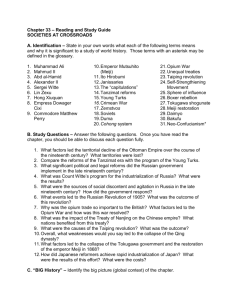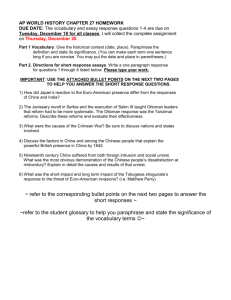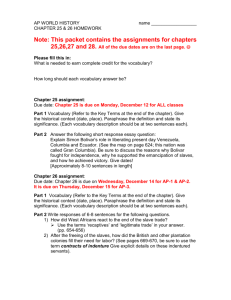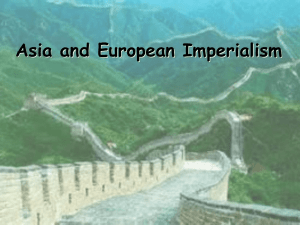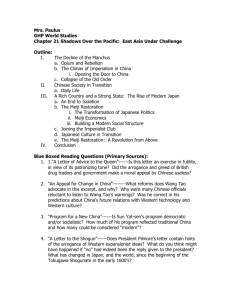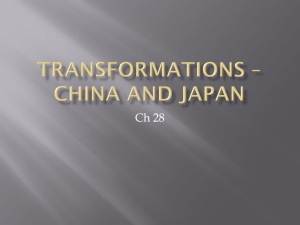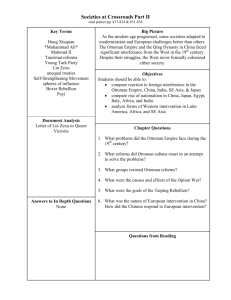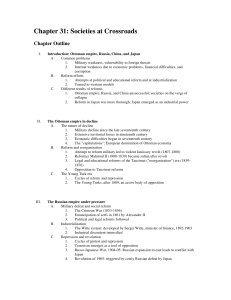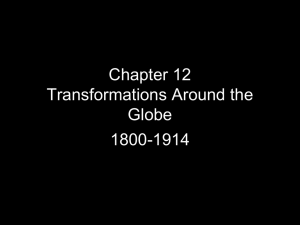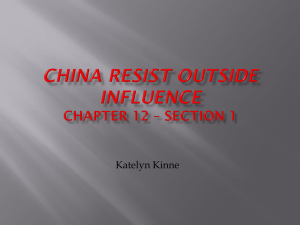AP WORLD HISTORY CHAPTER 27 HOMEWORK
advertisement
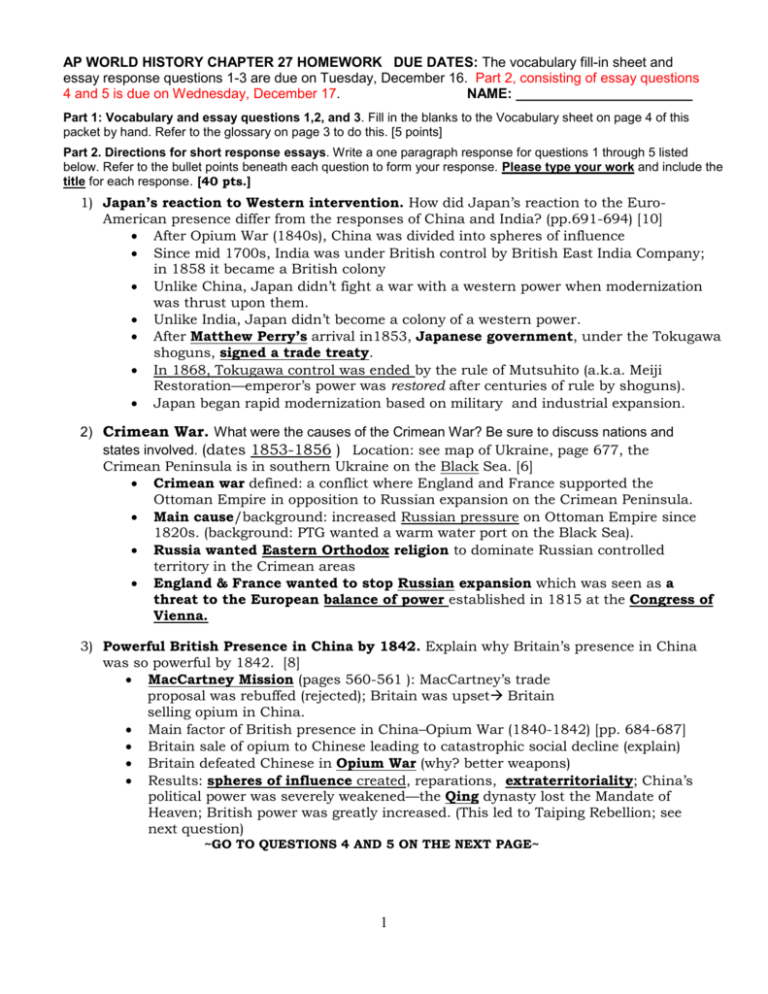
AP WORLD HISTORY CHAPTER 27 HOMEWORK DUE DATES: The vocabulary fill-in sheet and essay response questions 1-3 are due on Tuesday, December 16. Part 2, consisting of essay questions 4 and 5 is due on Wednesday, December 17. NAME: _______________________ Part 1: Vocabulary and essay questions 1,2, and 3. Fill in the blanks to the Vocabulary sheet on page 4 of this packet by hand. Refer to the glossary on page 3 to do this. [5 points] Part 2. Directions for short response essays. Write a one paragraph response for questions 1 through 5 listed below. Refer to the bullet points beneath each question to form your response. Please type your work and include the title for each response. [40 pts.] 1) Japan’s reaction to Western intervention. How did Japan’s reaction to the EuroAmerican presence differ from the responses of China and India? (pp.691-694) [10] After Opium War (1840s), China was divided into spheres of influence Since mid 1700s, India was under British control by British East India Company; in 1858 it became a British colony Unlike China, Japan didn’t fight a war with a western power when modernization was thrust upon them. Unlike India, Japan didn’t become a colony of a western power. After Matthew Perry’s arrival in1853, Japanese government, under the Tokugawa shoguns, signed a trade treaty. In 1868, Tokugawa control was ended by the rule of Mutsuhito (a.k.a. Meiji Restoration—emperor’s power was restored after centuries of rule by shoguns). Japan began rapid modernization based on military and industrial expansion. 2) Crimean War. What were the causes of the Crimean War? Be sure to discuss nations and states involved. (dates 1853-1856 ) Location: see map of Ukraine, page 677, the Crimean Peninsula is in southern Ukraine on the Black Sea. [6] Crimean war defined: a conflict where England and France supported the Ottoman Empire in opposition to Russian expansion on the Crimean Peninsula. Main cause/background: increased Russian pressure on Ottoman Empire since 1820s. (background: PTG wanted a warm water port on the Black Sea). Russia wanted Eastern Orthodox religion to dominate Russian controlled territory in the Crimean areas England & France wanted to stop Russian expansion which was seen as a threat to the European balance of power established in 1815 at the Congress of Vienna. 3) Powerful British Presence in China by 1842. Explain why Britain’s presence in China was so powerful by 1842. [8] MacCartney Mission (pages 560-561 ): MacCartney’s trade proposal was rebuffed (rejected); Britain was upset Britain selling opium in China. Main factor of British presence in China–Opium War (1840-1842) [pp. 684-687] Britain sale of opium to Chinese leading to catastrophic social decline (explain) Britain defeated Chinese in Opium War (why? better weapons) Results: spheres of influence created, reparations, extraterritoriality; China’s political power was severely weakened—the Qing dynasty lost the Mandate of Heaven; British power was greatly increased. (This led to Taiping Rebellion; see next question) ~GO TO QUESTIONS 4 AND 5 ON THE NEXT PAGE~ 1 4) Unrest in Nineteenth Century China [6] Define the Taiping Rebellion (p.687) Explain causes of Taiping Rebellion Hong Xiuquan led the Rebellion; he had failed the civil service test & he probably went insane; he thought he was Jesus’ younger brother! About how many people died? 5) Short term impact (STI) and Long term impact (LTI) of Tokugawa’s response to Matthew Perry’s Arrival (pp. 691-694) [10] Tokugawa Japan ruled by controlled decentralization After signing Treaty with Perry and the USA, many regional leaders sought to overthrow the Tokugawa By mid 1800s many regional leaders had become estranged (divorced) from Tokugawa favor and control. (Explain) In 1868, the Tokugawa era ended when Mutsuhito became emperor (his reign from 1868-1912) is known as the Meiji Restoration. During Meiji Restoration, Japan conducted the most rapid period of modernization in human history; its military and industrial base were transformed ~See the vocabulary glossary on the next page~ Point scheme vocabulary 5 points; #1 = 10 points; #2 = 6 points; #3 = 8 points; #4 = 6 points; #5 = 10 points 2 Chapter 27 Student Vocabulary Glossary: Fill in the blanks to the Vocabulary sheet on page 4 of this packet by hand. Refer to the glossary BELOW to do this. [5 points] Janissaries: Soldiers, usually of non-Turkish origin, who belonged to an elite infantry corps of the Ottoman army. They formed a self- regulating guild, administered by a council of elected unit commanders. In the 1800s the Janissaries resisted the Tanzimat reforms because they had become very conservative. Tanzimat: The Tanzimat was a reorganization of the Ottoman Empire. It began in 1839 and it was a series of attempts to help modernize the Ottoman Empire. It ended in 1876 during the first constitutional era. Serbia: Kingdom of Serbia was a province of the Habsburg Monarchy from 1718 to 1739. It was formed from the territory south of the rivers Sava and Danube that Habsburg Monarchy conquered from Ottoman Empire in 1718, but was returned under Ottoman administration in 1739. Crimean war: Was fought between 1854 and 1856. It was fought between Russia and a group of nations including England and France including England, France who supported the Ottoman Empire. Russia lost. Opium war: Fought between the British and Qing China beginning in 1839; fought to protect British trade in opium; resulted in resounding British victory, opening of Hong Kong as British port of trade. Treaty of Nanking: The Treaty of Nanking was signed on August 29th, 1842 to mark the end of the First Opium War (1839–42). Significance: This led to many unfair practices such as extraterritoriality and Spheres of Influence, which in turn, led to the Taiping Rebellion. Extraterritoriality: Immunity from the local laws of a certain area, especially due to diplomatic negotiation. Example/significance: A British soldier who committed a crime in China would be tried in Britain. How did this make the Chinese feel? Why? Treaty ports: The treaty ports were port cities in China and Korea that were opened to foreign trade by the so-called Unequal Treaties after the Opium War. Significance: China was carved up into Spheres of Influence, territories centered around these ports controlled by Europeans. Taiping Rebellion: The Taiping Rebellion was a widespread civil war in China from 1850 to 1864, led by Christian convert Hong Xiuquan, against the ruling Qing Dynasty. Hong thought he was Jesus’ brother! About 20 million people died, mainly civilians, in one of the deadliest military conflicts in history. Meiji Restoration: In 1853, Matthew Perry , a naval commander from the United States, arrived in Japan and essentially forced them to open their ports to trade. This led to the restoration of the Emperor Meiji to power in Japan and involved overthrowing the Tokugawa Shogunate in 1868 and thus ended Japan’s isolation. The Meiji Restoration implemented technological modernization that made Japan a modern nation by the late 1800s. It was the most rapid modernization in human history! 3 Name _______________________ Directions. Fill in the blanks below. Detach this page and turn it in with the assignment written responses to questions 1-5. Please staple the entire assignment prior to class. Janissaries: _____________, usually of non-Turkish origin, who belonged to an elite infantry corps of the ______________army. They formed a self- regulating guild, administered by a council of elected unit commanders. In the 1800s, the ____________________resisted the _____________ reforms because they had become very conservative. Tanzimat Reforms: The Tanzimat was a reorganization of the ___________Empire. It began in 1839 and it was a series of attempts to help _____________ the Ottoman Empire. It ended in 1876 during the first constitutional era. Serbia: Just reread the definition and LOCATE this on map. You need to know where Serbia is!!! Crimean war: Was fought between 1854 and 1856. It was fought between ______________ and a group of nations including England, France who supported the Ottoman Empire. _____________ lost. Opium war: Fought ________________________________ beginning in 1839; fought to protect British trade in opium; resulted in resounding ______________ victory, and the opening of ___________ as a British port of trade. Treaty of Nanking: The Treaty of Nanking was signed on August 29th, 1842 to mark the end of the _____________________(1839–42). Significance: This led to many __________________ such as extraterritoriality and ____________________, which in turn, led to the _______________ Rebellion. Extraterritoriality: Immunity from the local laws of a certain area, especially due to diplomatic negotiation. Example/significance: A British _____________who committed a crime in ___________ would be tried in Britain. How did this make the Chinese feel? _________________ Treaty ports: The treaty ports were port cities in _____________ Korea that were opened to foreign trade by the so-called Unequal Treaties after the Opium War. Significance: China was carved up into ____________________________, territories centered around these ports controlled by Europeans. Taiping Rebellion: The Taiping Rebellion was a widespread civil war in China from 1850 to 1864, led by Christian convert Hong Xiuquan, against the ruling Qing Dynasty. Hong thought he was ___________ brother! About _______________________ people died, mainly civilians, in one of the deadliest military conflicts in history!!!!! Meiji Restoration: : In 1853, _______________________ , a naval commander from the United States, arrived in __________________and essentially forced them to open their ports to trade. This led to the restoration of the __________________ to power in Japan and involved overthrowing the ____________ __________________ in 1868, thus ending Japan’s isolation. The ________________________ implemented technological modernization that made Japan a __________________________ by the late 1800s. It was the _________________________________________________________________ . 4
